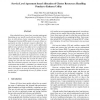Free Online Productivity Tools
i2Speak
i2Symbol
i2OCR
iTex2Img
iWeb2Print
iWeb2Shot
i2Type
iPdf2Split
iPdf2Merge
i2Bopomofo
i2Arabic
i2Style
i2Image
i2PDF
iLatex2Rtf
Sci2ools
106
click to vote
CLUSTER
2005
IEEE
2005
IEEE
Service Level Agreement based Allocation of Cluster Resources: Handling Penalty to Enhance Utility
Jobs submitted into a cluster have varying requirements depending on user-specific needs and expectations. Therefore, in utility-driven cluster computing, cluster Resource Management Systems (RMSs) need to be aware of these requirements in order to allocate resources effectively. Service Level Agreements (SLAs) can be used to differentiate different value of jobs as they define service conditions that the cluster RMS agrees to provide for each different job. The SLA acts as a contract between a user and the cluster whereby the user is entitled to compensation whenever the cluster RMS fails to deliver the required service. In this paper, we present a proportional share allocation technique called LibraSLA that takes into account the utility of accepting new jobs into the cluster based on their SLA. We study how LibraSLA performs with respect to several SLA requirements that include: (i) deadline type whether the job can be delayed, (ii) deadline when the job needs to be finished, (i...
CLUSTER 2005 | Cluster Computing | Cluster Resource Management | Service Level Agreements | Utility-driven Cluster |
| Added | 24 Jun 2010 |
| Updated | 24 Jun 2010 |
| Type | Conference |
| Year | 2005 |
| Where | CLUSTER |
| Authors | Chee Shin Yeo, Rajkumar Buyya |
Comments (0)

